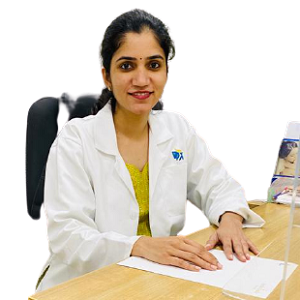Functions of Prenatal Screening & Test
The objective of prenatal screening & tests is to prevent both morbidity and mortality. It also helps to recognise the physical needs of a gestating mother. The test can also identify whether the baby has any congenital disabilities.
Prenatal screening & testing are essential for checking on the health of your developing baby and help you identify common genetic disorders for better planning.
First Trimester:
The first prenatal screening & test should be done within the first 11-13 weeks of pregnancy. During the first trimester, the most important things that need to be determined are the gestational age and estimated due date.
Ultrasound test helps the doctor know the most accurate gestational age, as well as, the estimated due date in the first trimester. This test will also identify the presence of uterine or adnexal abnormalities.
It would be best if your doctor performs a general physical and pelvic examination during the first obstetrical visit. This will assess the overall physical well-being of the pregnant mother. If the gestating mother has chronic medical and psychological conditions, the doctor can address these.
If your age is older than 20 years and the pelvic test did not include cervical cytology within the past 12 months. Then testing for Neisseria gonorrhoea and Chlamydia trachomatis needed to be performed.
The aneuploidy for the first trimester includes nuchal translucency measurement on ultrasound and maternal serum-free BhCG and PAPP-A to detect Down's syndrome and Trisomy 18.
During every first-trimester prenatal visit, you must evaluate the gestating mother's
- Maternal vital signsMaternal weight
- Urinalysis for glucose, protein and leukocytes.
Second Trimester:
The ultrasound and laboratory assessments of fetal genetic disorders and structural abnormalities during the 15 - 20 weeks of gestation in the second trimester. Screening for genetic diseases is now performed using maternal serum cell-free fetal DNA, a non-invasive prenatal test (NIPT).
Most will perform an oral glucose tolerance test (OGTT) during 26 – 28 weeks of gestation in the late second trimester to screen for gestational diabetes.
Third Trimester:
The focus of the third-trimester prenatal testing is on maternal well-being and reducing fetal morbidity and mortality. The major cause of neonatal morbidity and mortality is streptococcus agalactiae (GBS or group B streptococci beta-hemolytic).
The vaginal screening test for GBS is done during the late third trimester. If the test result is positive, the pregnant mother can receive treatment during the pregnancy before delivery during 34 – 37 weeks of gestation.
During every second and third prenatal visit, you must evaluate the gestating mother's
- Maternal vital signs
- Maternal weight
- Fetal heart rate
- Uterine fundal height
- Urinalysis for glucose, protein and leukocytes
An inter-professional team regarding prenatal screening helps you or your family to understand the limitations and benefits of the testing and its results. The team will also inform you about the risk of some prenatal tests like amniocentesis or chorionic villus sampling.
It would help if you also learned about the importance of the possibility of false negative and false positive results regarding genetic or chromosomal disorders. This will help you to make decisions regarding your pregnancy.
The inter-professional team should consist of a general healthcare provider, an obstetrician, a dietician and a prenatal nurse whom you can consult and learn everything regarding your prenatal test and its results.
Conclusion
Prenatal screening & tent helps identify the developing baby's health and the pregnant mother's required nutritional and medical needs. You should consult an inter-professional team regarding the prenatal screening test and its results.
Request an appointment at Apollo Cradle, DELHI-NCR - Chirag Enclave. Call 1860-500-4424 to book an appointment.
Prenatal screening is not a must but is essential to check on the health of your developing baby and to identify if there is any genetic disorder. It also helps identify the mother's physical needs and helps plan the required nutrition and medicines.
Prenatal screening tests include a blood test, urinalysis and ultrasounds, and routine pain-free tests.
First-trimester screening involves an ultrasound examination and the mother's blood sample. Second-trimester screening only requires the mother's blood sample. You can also do a combined screening of first and second-trimester screening.
Visiting during the first appointment and the prenatal ultrasound exam is good if you want to know what's happening, and your partner will likely appreciate it.
Prenatal screening tests can be administered as early as ten weeks into pregnancy.
Our Doctors
Treatments
- Blood Tests
- Down Syndrome Screening
- Early Anomaly Scan
- Fetal Anomaly Scan
- Fetal Echocardiography scan
- Fetal Ultrasound
- Fetal Well-Being Scans With Fetal Doppler
- Nuchal Translucency (NT Scan)
- Pre-eclampsia Screening
- Prenatal Screening & Test
- Screening For Maternal Infections
- Surveillance And Monitoring Of Twin Pregnancies
- Tests For Thalassemia And Sickle Cell Disease
- Viability Scan

 95 Patient Satisfaction Score
95 Patient Satisfaction Score

